Summary
A sales CRM simplifies prospecting and sales management by providing tools for contact management, interaction tracking, and data analysis. This software is indispensable for sales teams, offering the agility needed to excel in a competitive market and convert interactions into sales.
Try Ringover For Free!This article explores the benefits of a CRM in prospecting and sales, highlighting why it is crucial for improving commercial efficiency and customer relationships. We will also guide you on how CRM systems work and how to select the right software for your needs.
Top 7 Sales CRMs
Searching for the ideal sales CRM software can be daunting given the abundance of choices available. To guide you, here's our selection of the top 7 sales CRMs, each with unique advantages and disadvantages, aimed at helping businesses identify the most suitable software for their specific needs:
1. Salesforce
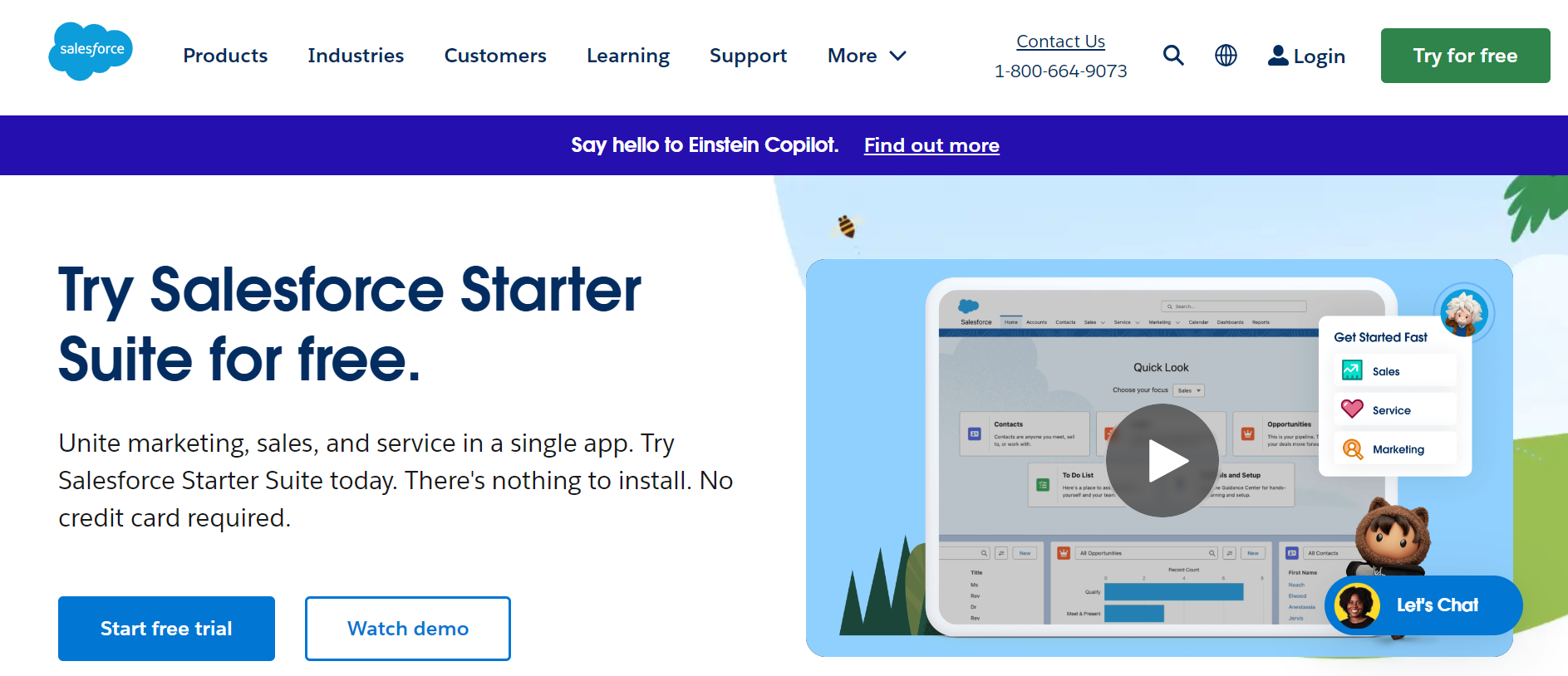
Recognized as a leading sales CRM system, Salesforce offers a flexible, adaptable cloud platform. It enables efficient data management, analysis, and retrieval in real time, catering to agents and businesses.
2. HubSpot
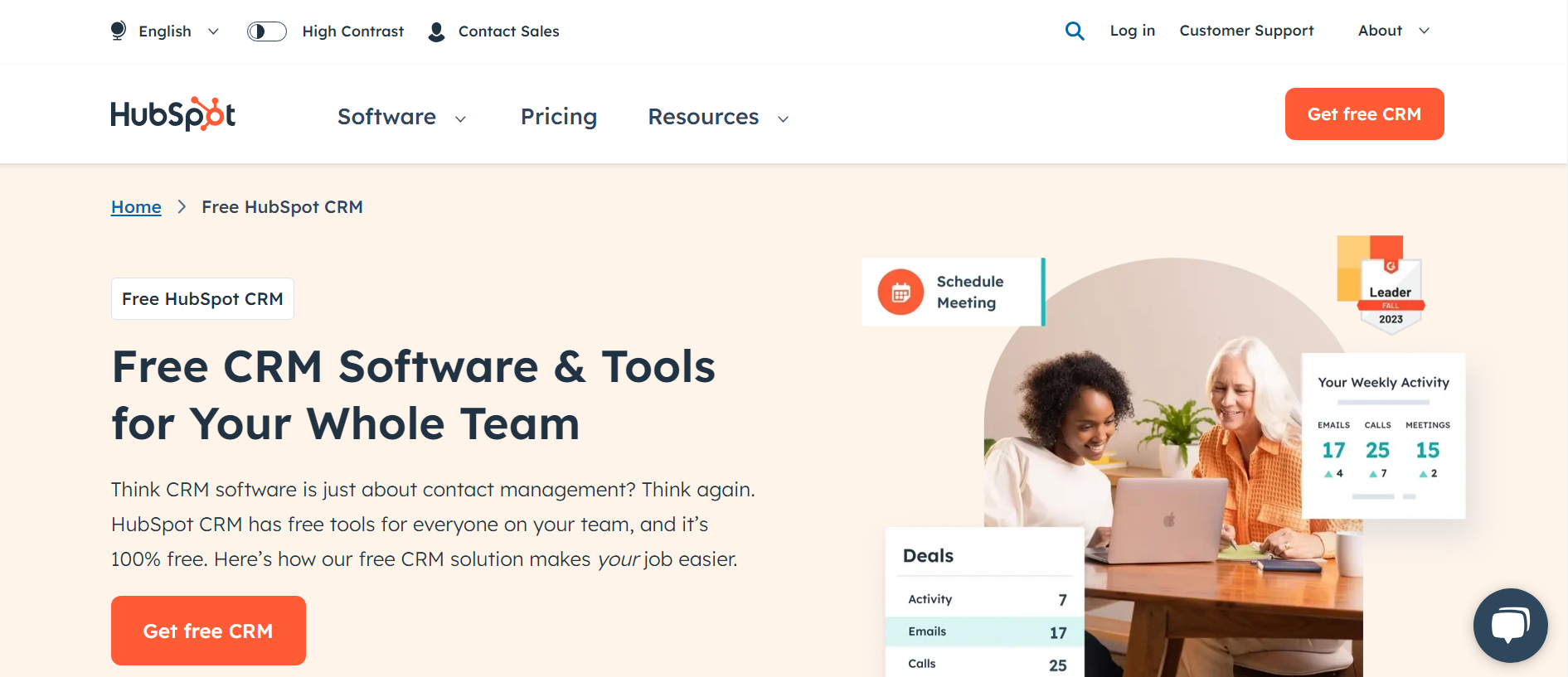
HubSpot is a popular platform that integrates all necessary tools for marketing, sales, content management, and customer service. It enables accurate tracking of customer interactions and revenue forecasting while measuring the productivity of sales teams. HubSpot also enriches the experience with tools for social media marketing, content management, web analytics, and SEO.
3. Zoho CRM

Zoho CRM offers a comprehensive and cost-effective solution encompassing sales, marketing, and customer service management. With tools for lead management, customer segmentation, and campaign personalization, Zoho CRM is particularly well-suited for small and medium-sized enterprises due to its competitive pricing and ease of use.
Video button
4. Freshworks CRM (formerly FreshSales)
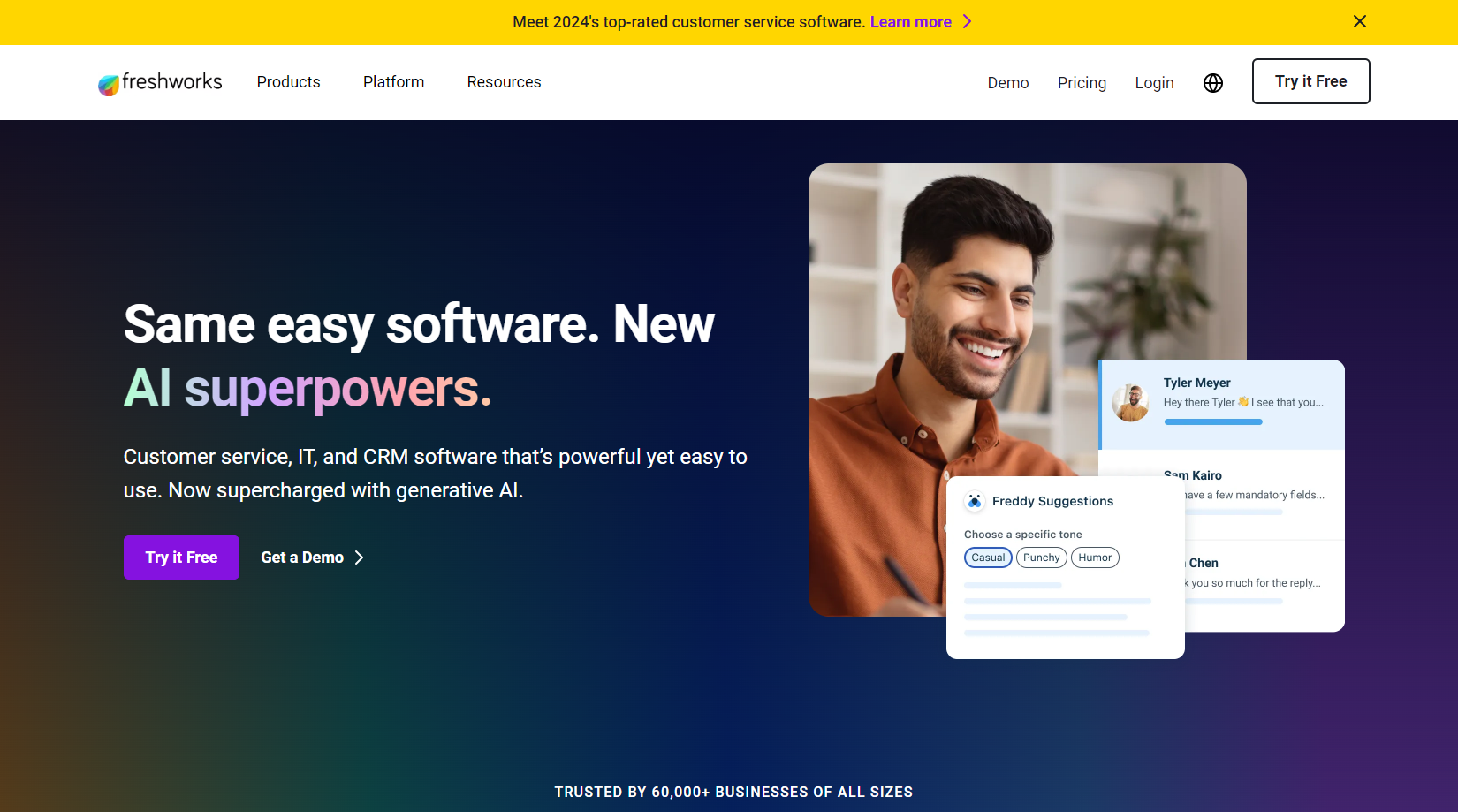
Freshworks CRM stands out for its focus on quality customer interactions, integrating advanced customer support tools. It covers sales, marketing, and customer service management, providing integrations with project management systems and chat platforms.
5. Pipedrive
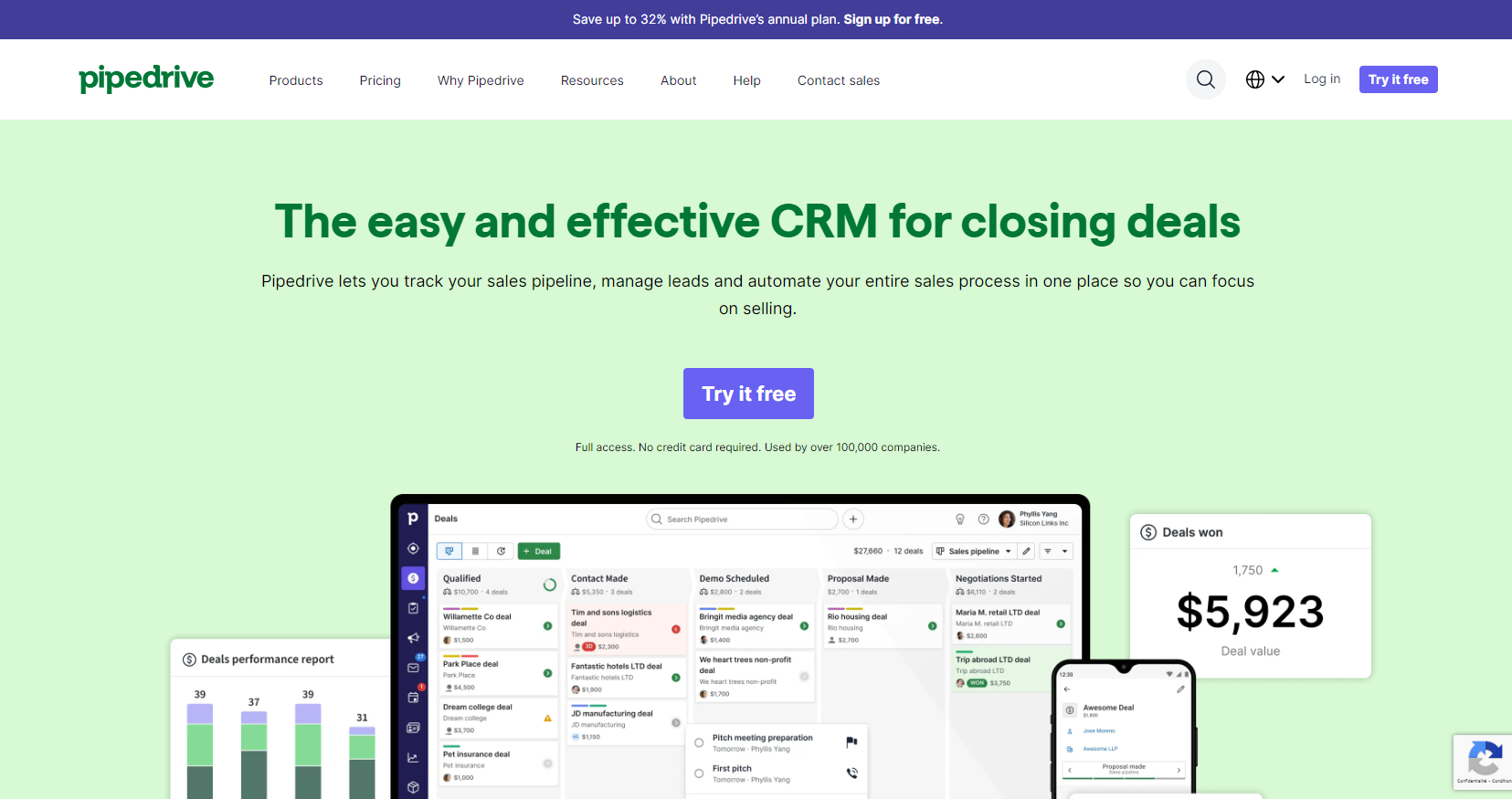
Specializing in sales management, Pipedrive aims to optimize sales pipelines for commercial teams. It offers tools for lead tracking, task management, and visualizing sales pipelines.
6. Monday
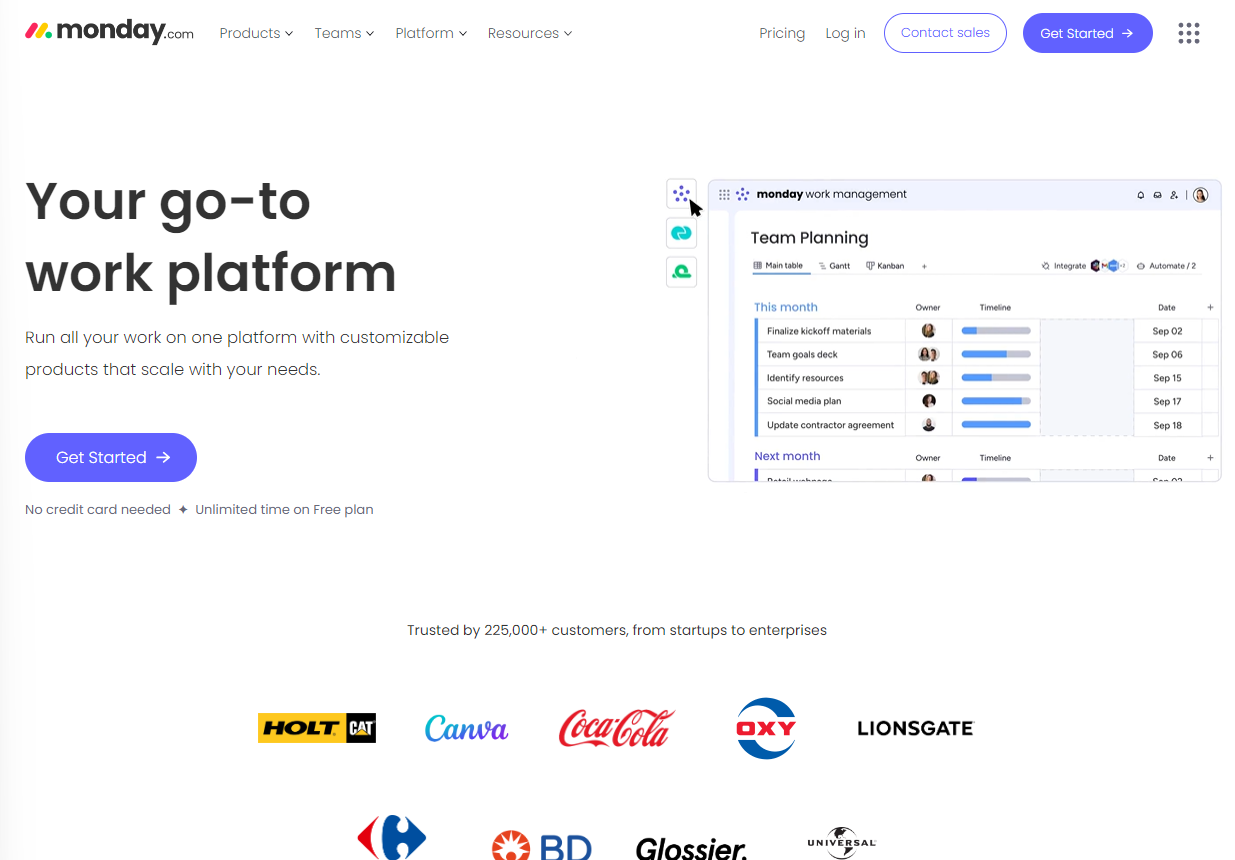
Monday provides a flexible platform allowing customization of workflows according to the needs of each business. With features for task management, project tracking, and process automation, it is ideal for teams seeking adaptability.
7. Microsoft Dynamics
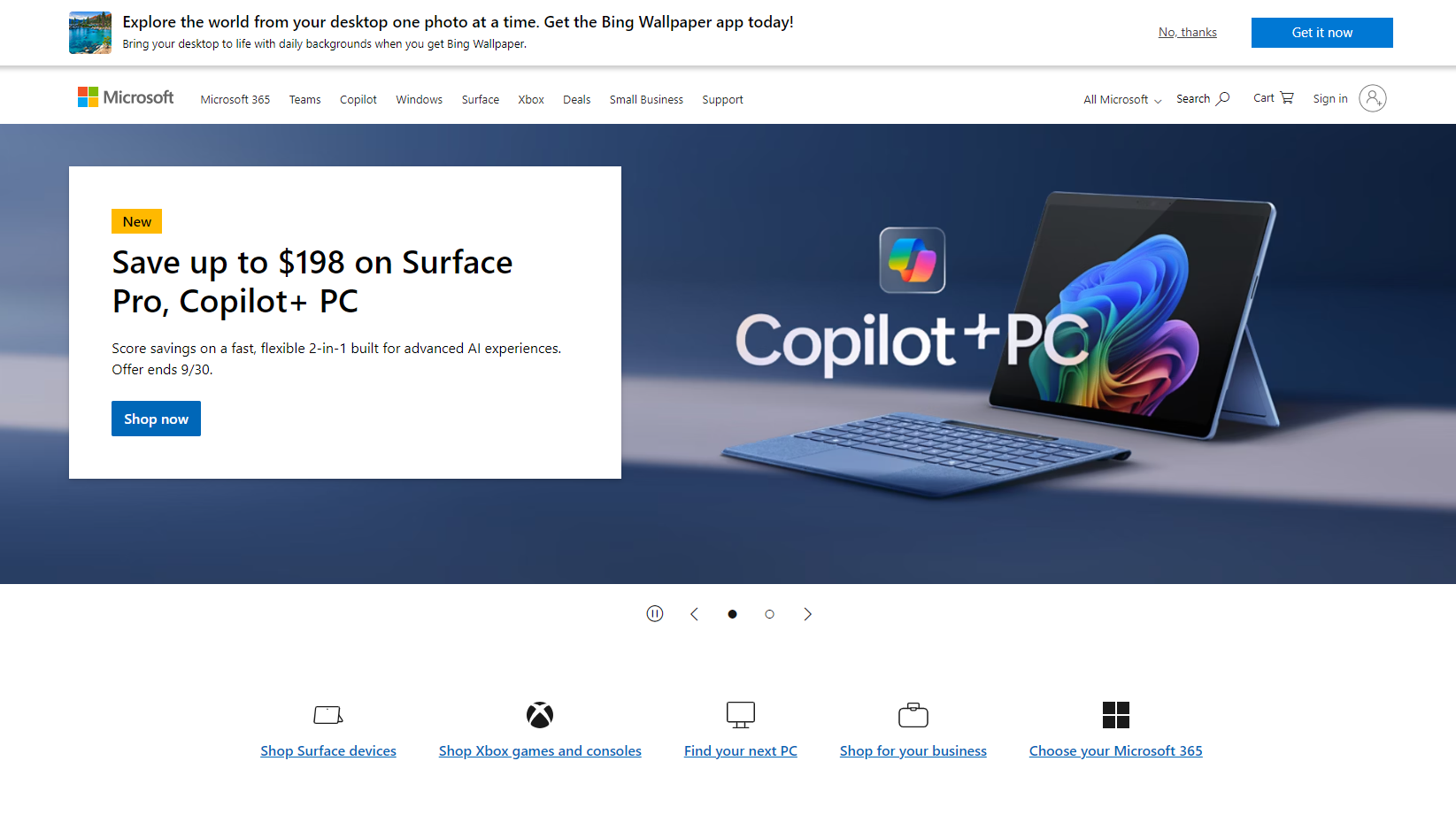
Microsoft Dynamics is a robust CRM offering advanced features for sales, marketing, and customer service management. It is particularly suited for large enterprises needing ERP integrations and advanced project management capabilities.
The 8 Main Advantages of a Sales CRM Software
Adopting a sales CRM brings significant transformation to the prospecting and sales processes within a company. Let's explore the eight key benefits:
360° Visibility of Your Contacts
By centralizing all information related to prospects and customers, a CRM provides a comprehensive view of their interactions, preferences, and purchase history. This visibility enables sales teams to better understand customer needs and tailor their approach accordingly.
Optimized CRM Prospecting
CRM prospecting simplifies the sales process by automating repetitive tasks and providing effective tools for managing marketing campaigns and communications. This allows salespeople to focus on high-value interactions, increasing conversion rates.
Improved Collaboration
CRMs encourage collaboration between marketing, sales, and customer service teams by facilitating the sharing of information and tasks. This ensures alignment and the pursuit of common goals.
Efficient Data Management
A CRM prevents duplicate entries or data loss by providing secure, centralized access to all information, ensuring data accuracy and up-to-date records essential for informed decision-making.
Process Automation
Automation of multiple tasks, such as calendar management, interaction tracking, and sales forecasting, is a key feature of sales CRMs. It frees up time for salespeople to concentrate on selling.
Analysis and Reporting
With integrated analytics, CRMs facilitate data collection and analysis, offering valuable insights. These insights help businesses better understand their customers and refine their sales strategies.
Better Customer Service
By gathering customer information, a CRM enhances the ability of service teams to respond effectively to inquiries, thereby improving customer satisfaction and loyalty.
Mobility and Accessibility
Mobile applications available for many CRMs offer salespeople the flexibility to work from anywhere, while still having access to all of the system's functionalities, boosting productivity.
A VoIP software allows you to stay in touch with your customers effortlessly, thanks to a variety of communication channels available, like text messages, unlimited calls, social media messaging, voicemail, and more.
Why Use Sales CRM Software? What Are the Benefits for Prospecting and Sales?
The adoption of a sales CRM is essential for companies aiming to boost sales efficiency and strengthen customer relationships. Here's why a CRM is critical for prospecting and sales:
Data and Interaction Centralization
A CRM consolidates all information regarding prospects and customers, providing a full view of their interactions, preferences, and purchase history. This enables sales teams to better understand their clients' needs and tailor their approach.
Optimizing CRM Prospecting Processes
With integrated CRM prospecting tools, CRMs enhance the management of marketing campaigns and communications by automating repetitive tasks and minimizing errors and duplication. This gives sales teams more time to focus on high-value sales opportunities.
Improving Collaboration
A CRM fosters collaboration between marketing, sales, and customer service teams by facilitating information and task sharing. This ensures cohesion and synergy between departments, all working towards common goals.
Effective Lead Management
CRMs facilitate tracking sales opportunities, transforming prospects into customers through clear sales pipelines. This helps sales teams prioritize the most promising leads and optimize their time management.
A sales CRM is, therefore, not just a tool for managing customer relationships, but a vital asset for driving growth, increasing productivity, and maintaining strong client relationships in today's competitive landscape.
Analysis and Reporting
The analytical capabilities of CRM systems allow businesses to collect and analyze data for accurate insights. These analyses help companies better understand their customers and refine their sales strategies, leading to increased commercial performance.
Mobility and Accessibility
Many sales CRMs offer mobile applications, enabling sales teams to remain productive while on the move, with full access to the software's functionalities. This enhances the flexibility and productivity of sales teams.
Customer Loyalty
By centralizing customer data, a sales CRM software empowers service teams to respond more effectively to client needs, thereby improving satisfaction and customer loyalty—key components for long-term growth.
Creating New Opportunities
CRMs boost the creation of new sales opportunities by improving visibility into clients and prospects. This facilitates commercial prospecting and accelerates the capture of sales opportunities.
How Does a CRM Work?
💡 Key Takeaway: A sales CRM centralizes and utilizes customer data, tracks interactions, automates processes, and provides analytical and support tools for sales and marketing teams. This comprehensive approach improves customer relationship management and strengthens the company's commercial strategy.
A sales CRM system optimizes the management of interactions with clients and prospects through the integration of key components. Here's a detailed breakdown of how it works:
Storage and Organization of Customer Data
The foundation of a CRM is to collect and organize customer information, such as contact details, purchase histories, preferences, and other relevant data. This information is centralized for easy access by sales and marketing teams, facilitating its use.
Tracking Customer Interactions
The CRM records all interactions between the company and its clients, including calls, emails, meetings, and other forms of communication. This data is stored in the customer profile, offering a comprehensive overview of past interactions to sales teams, helping refine their prospecting strategies.
Process Automation
Sales CRMs automate repetitive tasks to minimize errors and save time. This includes automating marketing campaigns, sales activities, and workflows, such as scheduling marketing emails or posting automatically on social media.
Tools for Sales and Marketing Teams
CRMs provide specific tools to effectively leverage the stored data. This includes creating targeted lists for campaigns, tracking their performance, and using purchase history to optimize cross-selling and upselling opportunities.
Analysis and Reporting
With integrated analytical tools, CRMs facilitate the collection and analysis of data to gain insights into performance and customer satisfaction. This information is essential for adjusting sales and marketing strategies based on observed trends.
Integration with Other Tools: Most sales CRMs can connect to other tools and platforms, such as social media, project management systems, and messaging applications, ensuring a more integrated and efficient management of customer interactions.
Final Thoughts
In conclusion, adopting a sales CRM is essential for improving customer relationship management, optimizing sales processes, and facilitating collaboration within teams.
Using a CRM offers numerous advantages, such as effective contact management, task automation, enhanced customer communication, and detailed performance analysis to boost sales.
By selecting the right sales CRM, companies can tailor their strategies more personally, retain their clientele, and increase commercial performance. It is advisable to carefully review the different CRM options available and incorporate this tool into your commercial strategy to optimize your performance.
Explore how to integrate communication solutions into your CRM by requesting a personalized demonstration or taking advantage of a free trial.



